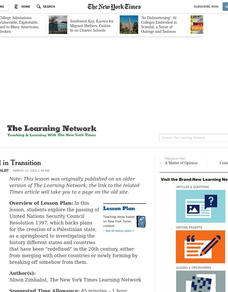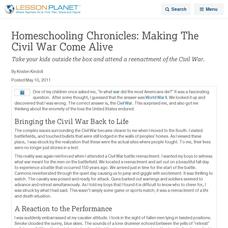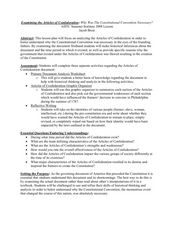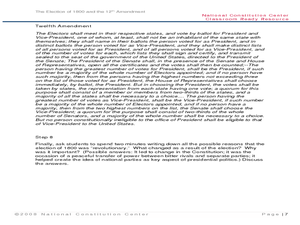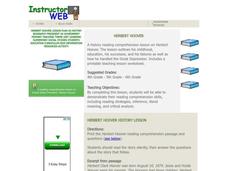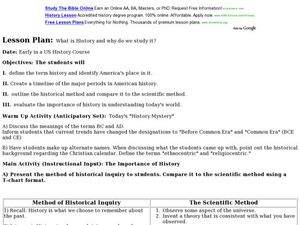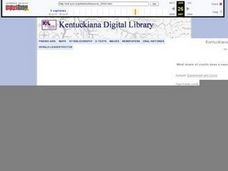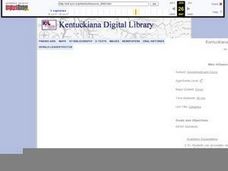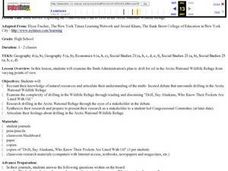Curated OER
Understanding Stereotypes
Pupils confront age-related stereotypes, explore how stereotyping impacts their lives, and discuss how they can make changes to reduce over-generalizations, unfair assumptions, and critical judgments about people groups. They use a...
Curated OER
Genetically Modified Organisms
High Schoolers complete a variety of activities as they examine the ethics of (and take a position concerning) genetically modified organisms in the field of agriculture. They complete a PowerPoint demonstration to go along with the unit.
Houghton Mifflin Harcourt
Journeys: Challenge Activities (Theme 1)
This nine-page packet, the first in the series of support materials for the Houghton Mifflin Harcourt thematic units on journeys, contains enrichment activities for learners who have mastered the basic concepts of the lessons....
DocsTeach
WWI Propaganda and Art
Uncle Sam wants you! During World War II, the US government and military created a propaganda campaign to gain public support. The activity uses primary documents such as photos to explain how and why the propaganda campaign was...
Newseum
Free Press Challenges Through History: Analyzing Historical Sources
The debate over the integrity of stories in media is not new. Young journalists analyze historical sources that reveal freedom of the press controversies and draw parallels to challenges freedom of the press faces today.
Curated OER
A World in Transition
Students explore the passing of United Nations Security Council Resolution 1397, which backs plans for the creation of a Palestinian state, as a springboard to investigating the history different countries that have been redefined in the...
Curated OER
Presidents' Day Activities
President's Day activities can provide a variety of ways to help students learn about the presidents.
Curated OER
Team Works
Young scholars define "group" and list American social and political movements throughout history. They examine one model of a successful team and positive group mentality by reading and identify the traits of a successful group and...
Curated OER
Homeschooling Chronicles: Making The Civil War Come Alive
The Civil War is a complex topic that students can study in a variety of ways, including watching a reenactment.
Curated OER
The Hmong Migration
Seventh graders investigate possible reasons the Hmong settled in Kansas. In this United States History lesson, 7th graders read an article that discusses the history of the Hmong people, then have a class discussion on the article...
National First Ladies' Library
Martha Goes To War!
High schoolers investigate how women went to war and the contributions that they have made in history. They conduct research using a variety of resources. The information is used in order to create a class presentation and answer some...
Curated OER
History Mystery Message Challenge
Eleventh graders examine the US Constitution. In this American Government activity, 11th graders gather the history and government facts to solve the history message.
Curated OER
Why was the Constitutional Convention Necessary?
Eleventh graders explore the steps leading up to the Constitution. For this American Government lesson, 11th graders practice document based questions. Students create a letter that describes how a person felt during...
Curated OER
Why We Chose Our Constitution
Students examine the American plan for government. In this American government lesson plan, students examine selected Internet websites regarding the Magna Carta, the Articles of Confederation, and the Constitution.
Curated OER
Secession Crisis: In Two Virginia Communities
Students are divided into groups and are assigned newspaper articles from the year 1861. The articles are from either Republican or Democratic parties discussing the Virginia secession. They complete worksheets and have a whole class...
Curated OER
Understanding the Election of 1800 and the Twelfth Amendment
Eleventh graders examine the election of 1800. In this American Government lesson, 11th graders summarize the events that made the election controversial. Students advocate for a candidate during a short role playing...
Curated OER
What was life like for the Civil War Soldier?
Students view various primary sources and complete a worksheet about the sources. They choose at least three sources: a print, a letter and a newspaper article and record relevant information. They write a journal response about life as...
Curated OER
Herbert Hoover
Students practice their reading comprehension skills by reading an article about Herbert Hoover. They answer questions to test for comprehension.
Curated OER
European Union: Myths and facts
Young scholars examine the difference between myths and facts presented about the European Union. They read and discuss articles about the EU and its role in European politics by evaluating a referendum to the EU constitution.
Curated OER
What is History and Why Do We Study It?
Students examine why it is important to study American history. In this American history instructional activity, students discuss why it is necessary to study history, arrange an outline of American history events in chronological...
Curated OER
Deism: Paine and Jefferson Student Worksheet
In this Deism worksheet, students read an article about the opinions of Thomas Paine and Thomas Jefferson. Students then respond to 12 short answer questions.
Curated OER
Federal Court Systems and Court Cases
Ninth graders investigate the basis for the Common Law Tradition. They examine the organization of the Federal Court System and students identify the various sources of the American Law.
Curated OER
Who influences the development of the laws?
Ninth graders explore how laws are created. They examine how committee members are selected. Students assess the influences that affect the voting of Congressional Committee Members. They identify the formal majority and minority leaders...
Curated OER
Exploring the Controversial Plan to Drill in the Arctic National Wildlife Refuge
High schoolers examine the Bush Administration's plan to drill for oil in the Arctic National Wildlife Refuge from varying points of view. They work in small groups in order to perform their research, but they compose individual journal...





